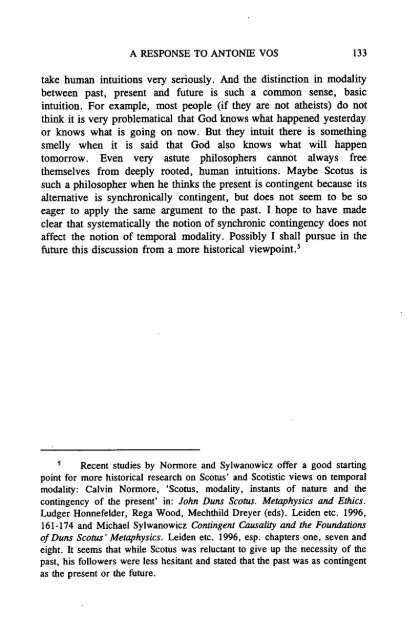Jaarboek Thomas Instituut 1997 - Thomas Instituut te Utrecht
Jaarboek Thomas Instituut 1997 - Thomas Instituut te Utrecht
Jaarboek Thomas Instituut 1997 - Thomas Instituut te Utrecht
Create successful ePaper yourself
Turn your PDF publications into a flip-book with our unique Google optimized e-Paper software.
A RESPONSE TO ANTONIE VOS 133<br />
take human intuitions very seriously. And the distinction in modality<br />
between past, present and future is such a common sense, basic<br />
intuition. For example, most people (if they are not atheists) do not<br />
think it is very problematical that God knows what happened yes<strong>te</strong>rday<br />
or knows what is going on now. But they intuit there is something<br />
smelly when it is said that God also knows what will happen<br />
tomorrow. Even very astu<strong>te</strong> philosophers cannot always free<br />
themselves from deeply roo<strong>te</strong>d, human intuitions. Maybe Scotus is<br />
such a philosopher when he thinks the present is contingent because its<br />
al<strong>te</strong>rnative is synchronically contingent, but does not seem to be so<br />
eager to apply the same argument to the past. I hope to have made<br />
clear that sys<strong>te</strong>matically the notion of synchronic contingency does not<br />
affect the notion of <strong>te</strong>mporal modality. Possibly I shall pursue in the<br />
future this discussion from a more historical viewpoint. 5<br />
Recent studies by Normore and Sylwanowicz offer a good starting<br />
point for more historical research on Scotus' and Scotistic views on <strong>te</strong>mporal<br />
modality: Calvin Normore, 'Scotus, modality, instants of nature and the<br />
contingency of the present' in: John Duns Scotus. Metaphysics and Ethics.<br />
Ludger Honnefelder, Rega Wood, Mechthild Dreyer (eds). Leiden etc. 1996,<br />
161-174 and Michael Sylwanowicz Contingent Causality and the Foundations<br />
of Duns Scotus' Metaphysics. Leiden etc. 1996, esp. chap<strong>te</strong>rs one, seven and<br />
eight. It seems that while Scotus was reluctant to give up the necessity of the<br />
past, his followers were less hesitant and sta<strong>te</strong>d that the past was as contingent<br />
as the present or the future.








